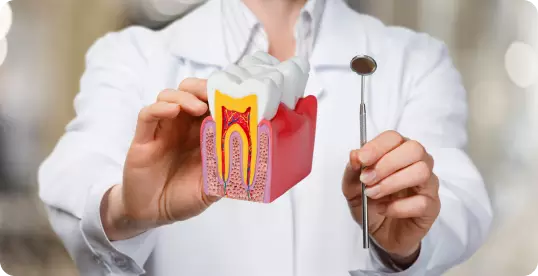Root Canal Therapy
Retain Your Natural Smile With Our Root Canal Treatment
Are you experiencing a sharp pain in your tooth that’s increasing in intensity? Or severe sensitivity to hot and cold temperatures? These symptoms could be an indication of an infected or damaged pulp, the innermost part of the tooth, containing blood vessels, nerves, and connective tissue. A root canal treatment can help treat the damaged tooth and save it from potential extraction.
At Lower Plenty Dental, we understand the stress and pain dental problems can cause. This is why we’re here to help guide you towards a healthier, pain-free smile. With a team of friendly dentists who take the time to listen to you, understand your concerns and tailor treatments to your oral and overall health needs, we’re your oral health partners for life.
When Is A Root Canal Needed?

Deep Tooth Decay
When tooth decay progresses to the point where it reaches the pulp, it can lead to an infection.
The infected pulp must be removed to help save the tooth.
Infection Or Abscess
Bacteria can enter the pulp chamber through cracks, chips, or deep cavities. This can lead to an infection or abscess, a pus-filled pocket that forms at the root tip. A root canal is necessary to clean out the infection and prevent its spread.
Trauma Or Injury
- Severe or persistent toothache
- Discoloured or darkened tooth
- Gum swelling and tenderness
- Pain when chewing or biting
- Foul odours or a bad taste in the mouth
- Prolonged sensitivity to hot and cold temperatures
Root Canal Treatment In Lower Plenty
While a root canal procedure may sound painful and the last thing anyone wants, the reality is completely different. The severe pain from a damaged pulp is what causes the pain. A root canal helps alleviate pain, removing its root cause to help you recover and achieve a healthier smile.
Your root canal therapy may consist of several appointments, which may involve:


Visit 1
At the first appointment, our dentist will give a local anaesthetic to numb the area. A rubber shield will be placed over the tooth to isolate the tooth and prevent contamination of the nerve canal.

Visit 2
The second appointment involves measuring and cleaning the root canal system, and radiographs are taken to determine the root canal lengths. In some cases, the root canal therapy may be completed at this visit.

Visit 3
If, at the third appointment, the tooth infection has settled and is free from discomfort and pain, our dentist will complete the root canal filling. A rubber shield is again placed over the tooth, and the root is filled.
Your Partner In Optimal Oral Health

